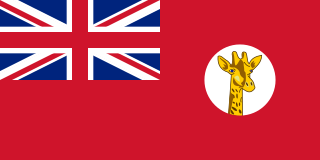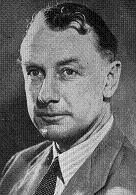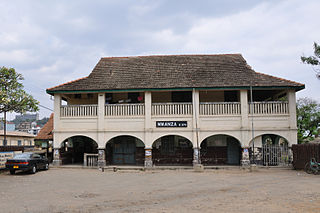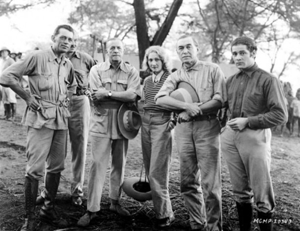Kenya, Uganda, Tanganyika (KUT) is the name on British postage stamps made for use in the British colonies of Kenya, Uganda, and Tanganyika. The stamps were circulated between 1935 and 1963 by the joint postal service of the three colonies, the East African Posts and Telecommunications Administration, reconstituted as part of the East African High Commission from 1948 to 1961, the East African Common Services Organization from 1961 to 1967, and the East African Community from 1967 to 1977. Even after independence, the new separate nations continued to use the KUT stamps, and they remained valid for postage until 1977.

The King's African Rifles (KAR) was a British Colonial Auxiliary Forces regiment raised from Britain's East African colonies in 1902. It primarily carried out internal security duties within these colonies along with military service elsewhere during the world wars and other conflicts, such as the Malayan Emergency and the Mau Mau uprising. The regiment's enlisted soldiers were drawn from the native Africans, while most officers were seconded from the British Army. During the 1960s, as part of the decolonisation of Africa, more African officers were commissioned into the regiment before it was gradually disbanded. KAR battalions would go on to form the core of newly established armed forces throughout East Africa.

The Protectorate of Uganda was a protectorate of the British Empire from 1894 to 1962. In 1893 the Imperial British East Africa Company transferred its administration rights of territory consisting mainly of the Kingdom of Buganda to the British government.

The East African Community (EAC) is an intergovernmental organisation composed of seven countries in the Great Lakes region of East Africa: the Democratic Republic of the Congo, the United Republic of Tanzania, the Republics of Kenya, Burundi, Rwanda, South Sudan, and Uganda. Évariste Ndayishimiye, the president of Burundi, is the current EAC chairman. The organisation was founded in 1967, collapsed in 1977, and was revived on 7 July 2000.

Sir Philip Euen Mitchell, was a British Colonial administrator who served as Governor of Uganda (1935–1940), Governor of Fiji (1942–1944) and Governor of Kenya (1944–1952).
Sir Frederick Crawford was a British colonial administrator.

Tanganyika was a colonial territory in East Africa which was administered by the United Kingdom in various guises from 1916 until 1961. It was initially administered under a military occupation regime. From 20 July 1922, it was formalised into a League of Nations mandate under British rule. From 1946, it was administered by the UK as a United Nations trust territory.

The Federation of Rhodesia and Nyasaland, also known as the Central African Federation or CAF, was a colonial federation that consisted of three southern African territories: the self-governing British colony of Southern Rhodesia and the British protectorates of Northern Rhodesia and Nyasaland. It existed between 1953 and 1963.

The Royal East African Navy was a unified naval force of the former British colonies of Kenya, Tanganyika, Uganda, and Zanzibar. It was the colonial forerunner of the Kenyan Navy and Tanzanian Navy. Formed in 1953, it was disbanded on 30 June 1962.
The Baháʼí Faith in Tanzania begins when the first pioneer, Claire Gung, arrived in 1950 in what was then called Tanganyika. With the first Tanganyikan to join the religion in 1952 the first Baháʼí Local Spiritual Assembly was elected in 1952 of Tanganyika in Dar es Salaam. In 1956 a regional Baháʼí Assembly which included Tanganyika was elected. Later each of the constituent countries successively formed their own independent Baháʼí National Spiritual Assembly and Tanganyika, with Zanzibar, formed its own in 1964 and it and the country was renamed Tanzania. Since 1986 the Baháʼís have operated the Ruaha Secondary School as a Baháʼí school. In 2005 Baháʼís were estimated at about 163,800 adherents.

Sir Robert Perceval Armitage was a British colonial administrator who held senior positions in Kenya and the Gold Coast, and was Governor of Cyprus and then of Nyasaland during the period of decolonisation.

The history of rail transport in Tanzania began in the late nineteenth century.

Sir William Frederick Gowers, KCMG was a British colonial administrator who was Governor of Uganda from 1925 to 1932.

Elizabeth II was Queen of Tanganyika from 1961 to 1962, when Tanganyika was an independent sovereign state and a constitutional monarchy. She was also the monarch of other sovereign states, including the United Kingdom. Her constitutional roles in Tanganyika were mostly delegated to the governor-general of Tanganyika.
The Hilton Young Commission was a Commission of Inquiry appointed in 1926 to look into the possible closer union of the British territories in East and Central Africa. These were individually economically underdeveloped, and it was suggested that some form of association would result both in cost savings and their more rapid development. The Commission recommended an administrative union of the East African mainland territories, possibly to be joined later by the Central African ones. It also proposed that the legislatures of each territory should continue and saw any form of self-government as being a long-term aspiration. It did however reject the possibility of the European minorities in Kenya or Northern Rhodesia establishing political control in those territories, and rejected the claim of Kenyan Asians for the same voting rights as Europeans. Although the commission's recommendations on an administrative union were not followed immediately, closer ties in East Africa were established in the 1940s. However, in Central Africa, its report had the effect of encouraging European settlers to seek closer association with Southern Rhodesia, in what became in 1953 the Federation of Rhodesia and Nyasaland.
The Ormsby-Gore Commission was a Parliamentary Commission, with the official title The East Africa Commission. Its chairman, William Ormsby-Gore, later the fourth Baron Harlech, was appointed in June 1924 together with two other Member of Parliament as commissioners. The terms of reference for the commission, which was appointed by the short-lived First MacDonald ministry, included to report on measures to accelerate economic development, to improve the social conditions of African residents, to investigate employment practices and to secure closer cooperation between the five British dependencies in East and Central Africa.
The Kabaka crisis was a political and constitutional crisis in the Uganda Protectorate between 1953 and 1955 wherein the Kabaka Mutesa II pressed for Bugandan secession from the Uganda Protectorate and was subsequently deposed and exiled by the British governor Andrew Cohen. Widespread discontent with this action forced the British government to backtrack, resulting in the restoration of Mutesa as specified in the Buganda Agreement of 1955, which ultimately shaped the nature of Ugandan independence.
William Morris Carter (1873–1960) was a British lawyer and colonial administrator. He served as registrar and judge in Kenya, Uganda and Tanganyika between 1902 and 1924. He tried without success to alienate lands held by Africans in Uganda so they could be organized as European plantations using native laborers. He chaired the 1925 Southern Rhodesia land commission and the 1932–1933 Kenya Land Commission, both of which alienated Africans from their land and allocated large areas for exclusively European settlement. He served on the Royal Commission on Palestine (1936–1937).

Sir William Alison Russell, KCMG (1875–1948), known as Sir Alison Russell was a Scottish lawyer who served in the British Colonial Legal Service as an attorney and judge.
Sir Colin Hardwick Thornley, KCMG, CVO was a British colonial administrator. He was Governor of British Honduras from 1955/6 to 1961.












